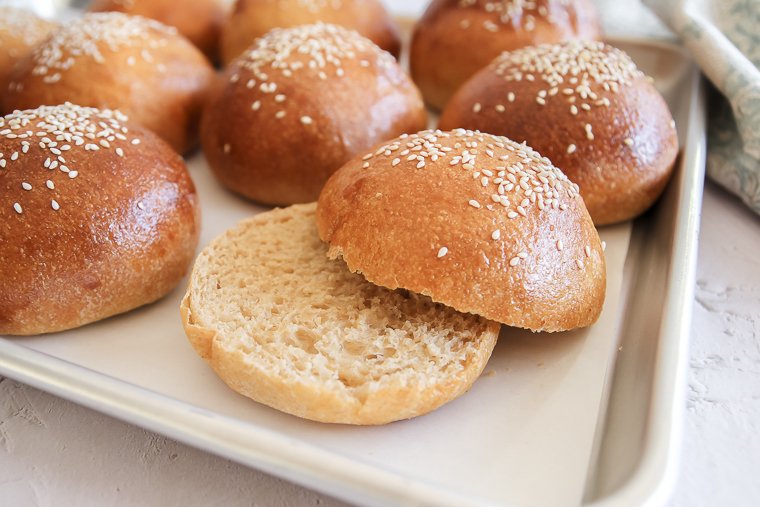
This post may contain affiliate links. See my full disclosure. As an Amazon Associate, I earn from qualifying purchases.
The best 100% whole wheat sourdough hamburger buns that are actually light and fluffy! This is a great recipe for freshly milled hard white or hard red wheat berries (or whole wheat flour that you purchase).
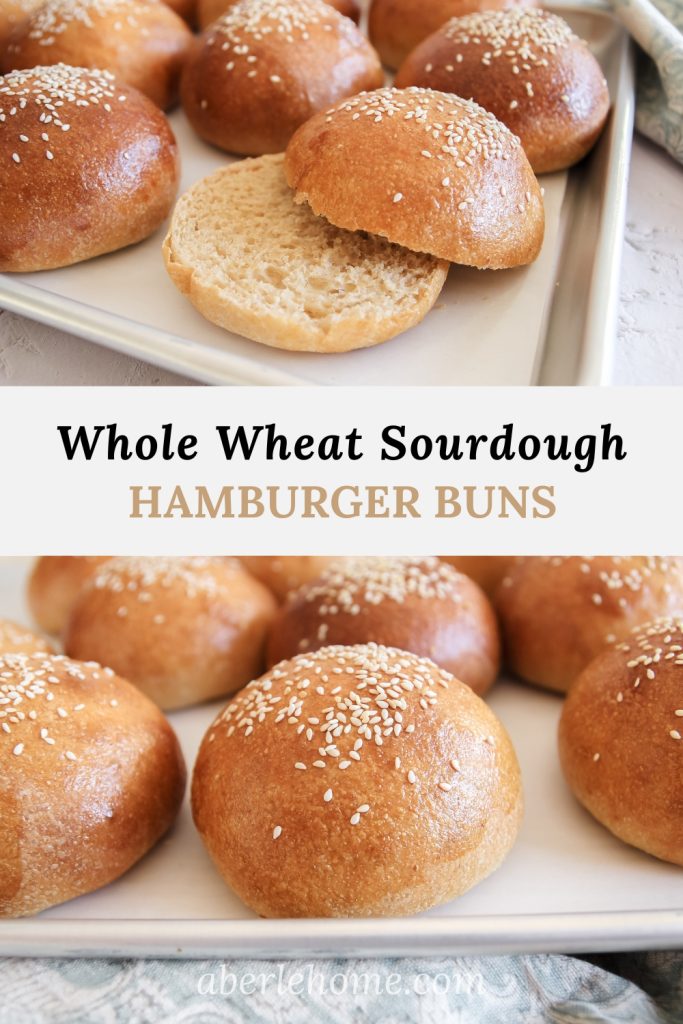
These whole wheat sourdough hamburger buns have the perfect texture for burgers, pulled pork, or deli meat sandwiches!
There is some quick prep the night before to make these buns the next day.
This recipe is a variation on my regular sourdough hamburger buns recipe which contains less than half whole wheat flour. Both recipes are only simple pantry ingredients.
I love to top them with sesame seeds before baking and toast them before serving.
I’m continually pushing the bounds to see how light and fluffy my freshly-milled flour enriched sourdough breads can be.
I’m happy with the texture of these hamburger buns. You get all the fermented wholegrain goodness in a bun that’s soft and not overly filling.
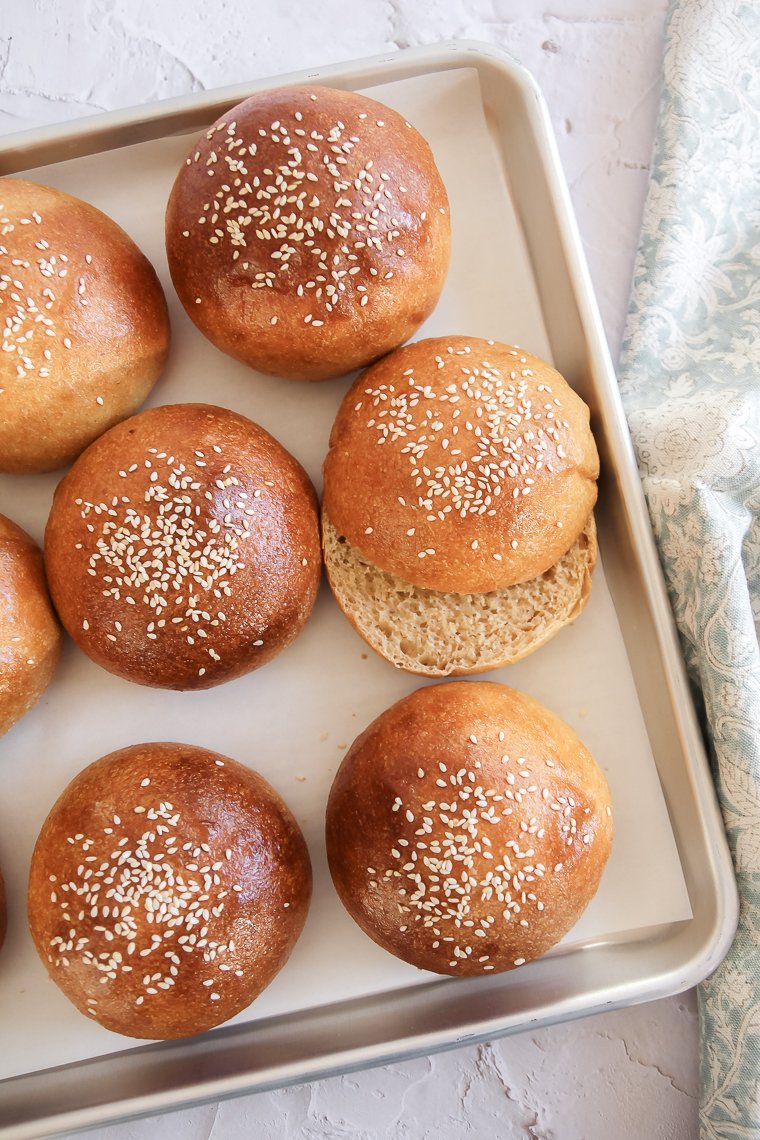
You may also like to try my whole wheat sourdough pita bread, whole wheat sourdough tortillas, whole wheat sourdough English muffins.
Making Sourdough Hamburger Buns with Freshly Milled Flour
If you’ve been around here long, you know I mill my own wholegrain flours.
I love how the various grains I mill bring increased nutrition, variety, and flavor to my sourdough breads and other baked goods.
Visit my beginner’s guide to milling flour at home to learn more.
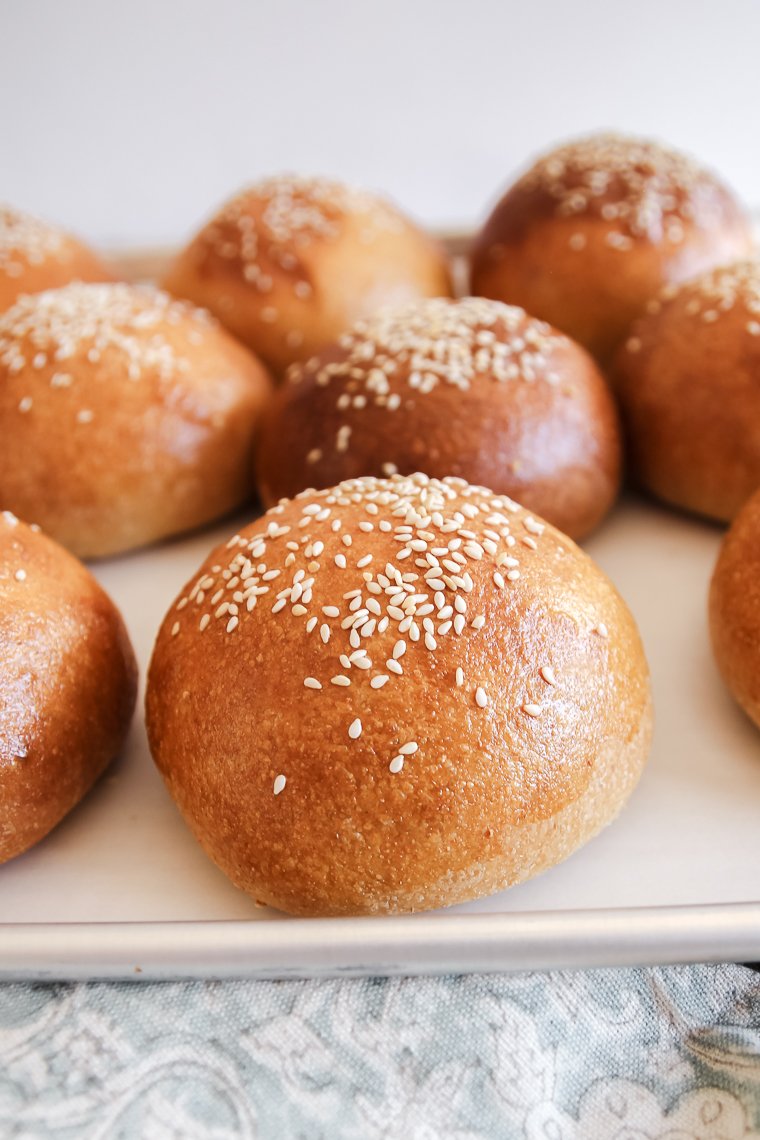
I milled hard white wheat berries for a lighter color and more mild “wheat” flavor. Hard red wheat would work great as well, if that’s what you have available.
I like to mill enough for the prepared starter, yundane, final dough, and some extra for dusting: 360g total.
Freshly milled flour is not necessary, though. You can likely find stone-ground white whole wheat flour right at your local grocery store.
Keys to Light and Fluffy Whole Wheat Sourdough Hamburger Buns
A huge reason these buns have such a nice texture is that a portion of the flour is scalded (yundane).
The flour is simply stirred with some boiling water the night before and is left in the refrigerator overnight while the flour gelatinizes.
The yundane functions as a natural dough enhancer and allows the whole wheat dough to absorb more liquid.
It also increases the shelf life of the whole wheat sourdough hamburger buns.
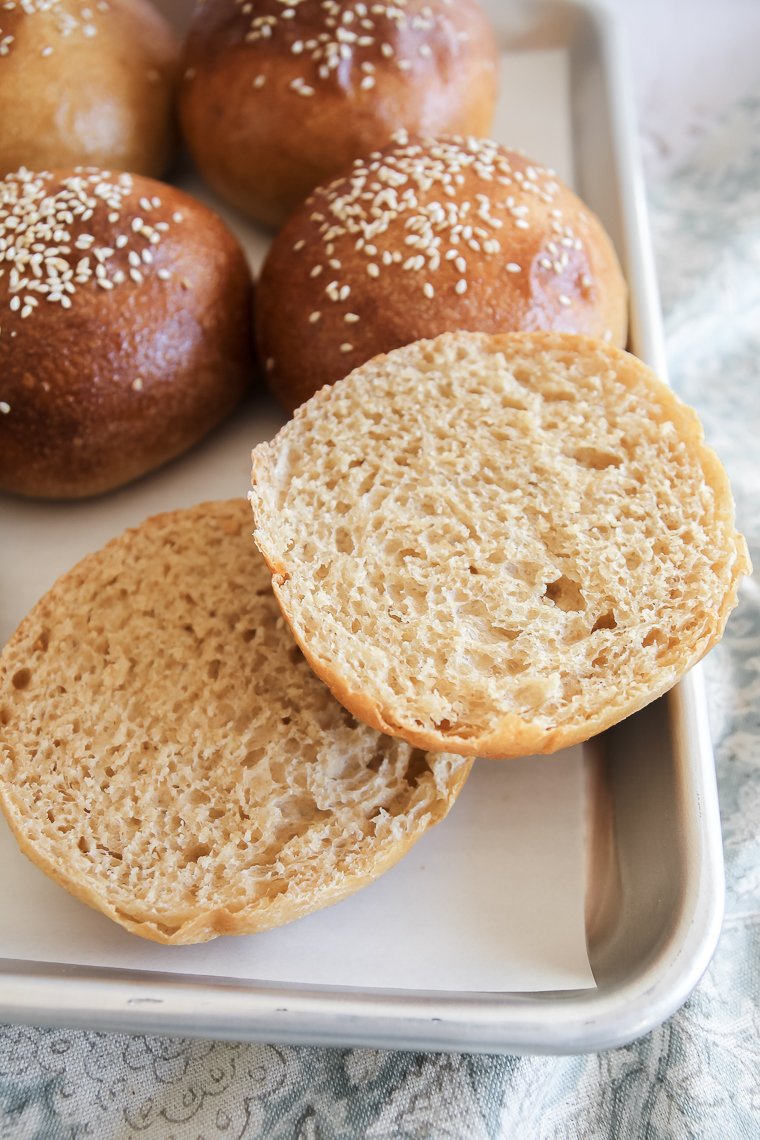
The other enrichments in the dough (egg, sugar, milk, and butter) also improve the flavor and texture.
This dough is best made in a mixer to develop the gluten structure upfront before bulk fermentation. (I love my Bosch Universal Plus mixer fitted with a dough.) There are no stretch-and-folds required.
The buns go through an extended proof until they are nice and puffy.
Notes About the Sourdough Starter
The prepared starter (levain) is mixed the night before so it reaches its peak by morning.
You’ll notice that sugar is added to the prepared starter. This is to control the acidity for less sour hamburger buns later.
Whole Wheat Sourdough Hamburger Buns Baking Schedule
*The temperature of your dough and kitchen will affect how long each step will take. I bulk fermented and proofed around 75°F with a final dough temp of 73°F after mixing. If your kitchen or dough are cooler, expect the rise times to be longer. Use the dough as your guide.
Approximate timing:
- Prepare yundane and starter (night before): 5 minutes
- Mix and knead dough (including 30 minute rest): 50 minutes
- Warm bulk rise: 2 hours
- Divide and shape: 15 minutes
- Proof: 3 hours, 50 minutes
- Bake: 18 minutes
Make your prepared starter and yundane before bed so you can start the dough the next morning. The process took me about 7.25 hours total on day 2.
Tips for Making Whole Wheat Sourdough Hamburger Buns
- The yundane needs to sit overnight for the starch in the flour to gelatinize. It will not function the same way if you try to make it the same morning you mix the dough.
- Make sure the prepared starter has reached it peak before you start the dough (I’ll show you what to look for in the steps below.) Give it extra time in the morning if needed.
- Two keys to the perfect soft and light texture are kneading the high-hydration dough sufficiently and pushing the proof. Though the sourdough whole wheat buns will look quite small after shaping, they will proof to the proper size. When you apply the egg wash, the buns should feel very soft to the touch and somewhat wobbly. They should have a fairly open crumb after baking. (If buns start to deflate when proofing, they have overproofed. You’ll notice the outside skin will separate from the body of the over-proofed bun after the bun has cooled.)
- This makes 10 standard-size burger buns that work well for quarter-pound hamburgers. If you want even larger sourdough buns, make only 8 buns (93g each) out of the recipe. You can also make small sourdough whole wheat slider buns by forming 20 buns (37g each) with the same amount of dough. If you want to make a double batch but don’t have an extra oven, you can fit up to 12 buns on one half-sheet pan; they will just be touching slightly after baking.
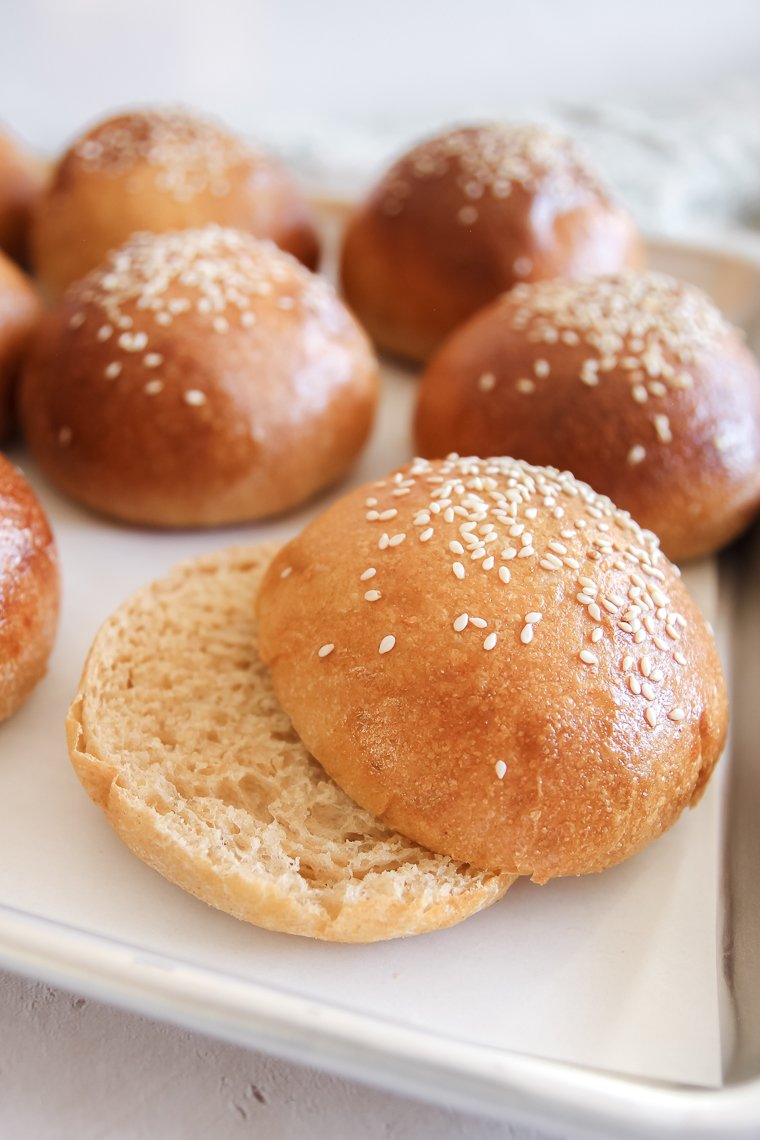
How to Make Whole Wheat Sourdough Hamburger Buns (Step-by-Step Instructions)
Step 1 (Night Before)– Prepare Starter and Yundane
Before bedtime, prepare the starter and yundane.
I list the ingredients in gram weights for accuracy. My go-to scale is this digital kitchen scale to weigh the ingredients, but any scale will work.
For the starter, mix some seed sourdough starter (from a white or whole wheat starter) with water, granulated sugar, and whole wheat flour in preparation for the recipe. Cover and leave at room temperature.
Mix the yundane in a separate container. Stir boiling water into the flour to essentially make a paste. Cover and refrigerate the yundane until the next morning.
By morning (after about 12 hours), the starter should have risen. It should have bubbles even in the top surface (as pictured below) and have a “yeasty” smell instead of a “raw flour” smell.
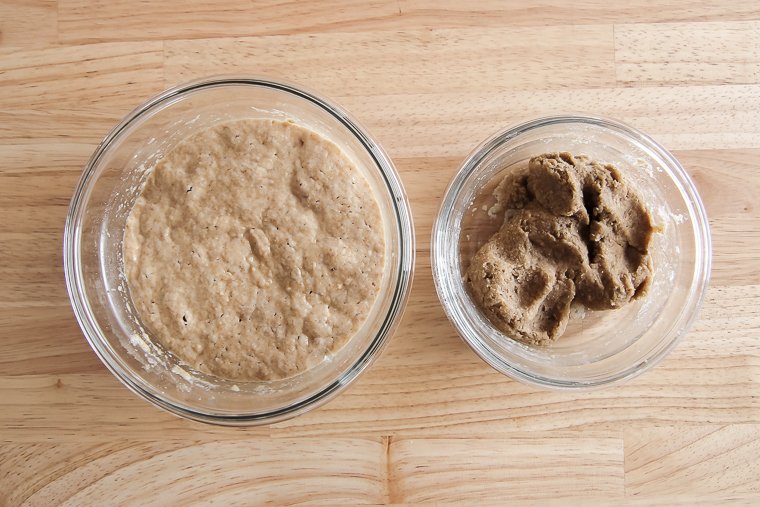
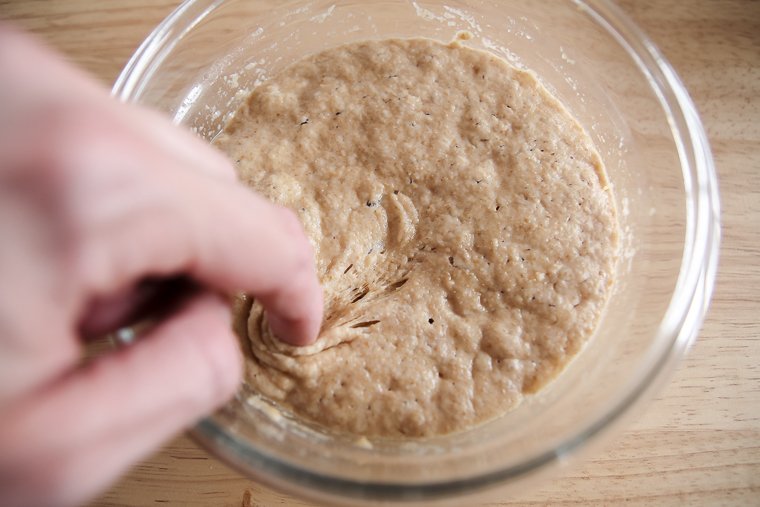
Make sure to give the starter extra time if you don’t feel like it’s at its peak.
When both of these elements are ready, you can mix the final dough.
Step 2 (Next Morning) – Mix and Knead Whole Wheat Sourdough Hamburger Bun Dough
In a mixer fitted with a dough hook (and also the dough hook extender for the Bosch), add the starter, yundane, whole wheat flour, egg, sugar, and whole milk. Reserve the salt and butter cubes for now.
Mix for a couple of minutes on low speed until those ingredients are combined.

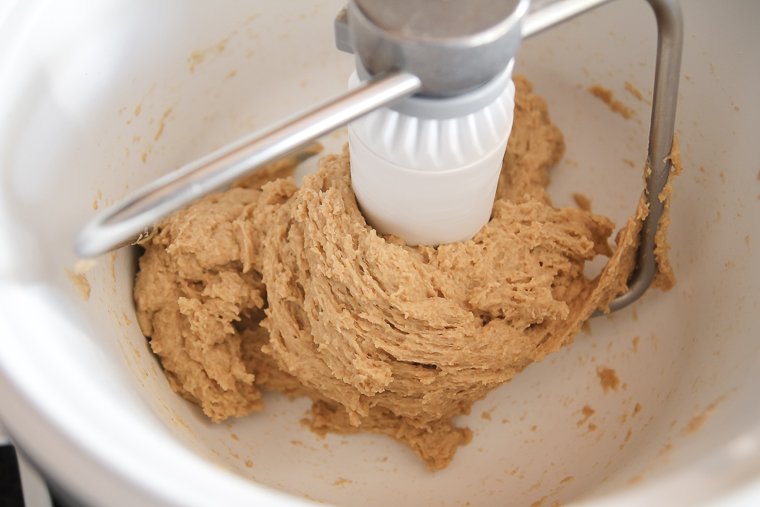
Cover the dough and allow it to sit and rest for 30 minutes. This time will kickstart gluten development.
After the rest, add in the salt and butter cubes and mix for a few minutes until the butter is thoroughly incorporated.
At this point the dough will be quite sticky and cling to the mixing bowl.
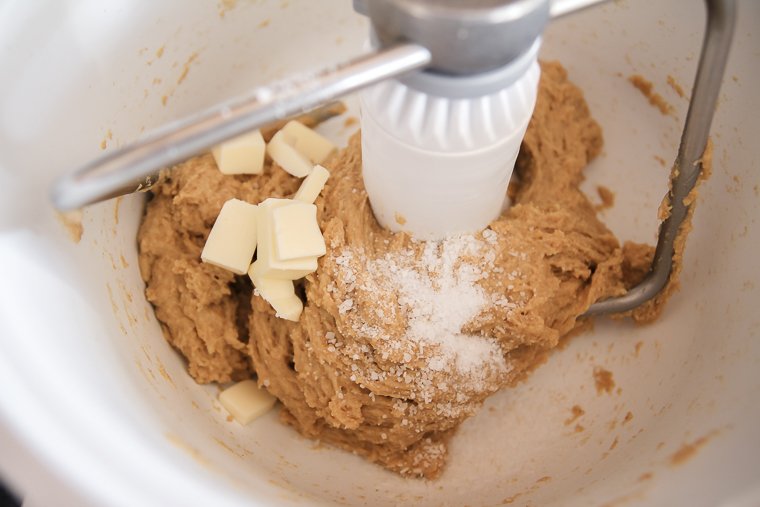
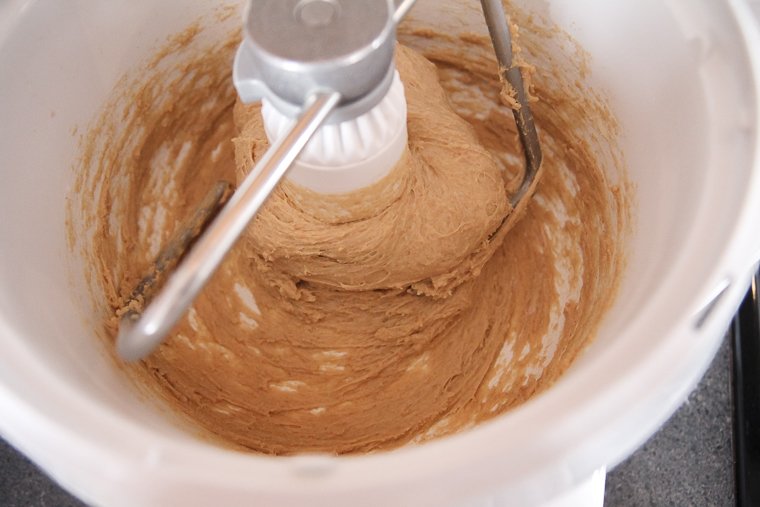
Continue to knead on low for 12-15 additional minutes until the dough changes to show the following signs of strength:
The dough should hold tightly to itself and the dough hook. It should have a shiny and smooth appearance, and after resting for a minute, you should be able to pull it into a dramatic, stretchy windowpane.
You’ll notice that the dough has a noticeably “taught” feeling at this point compared to what it was like after mixing the ingredients in.
Keep mixing if it hasn’t yet reached this point of development.
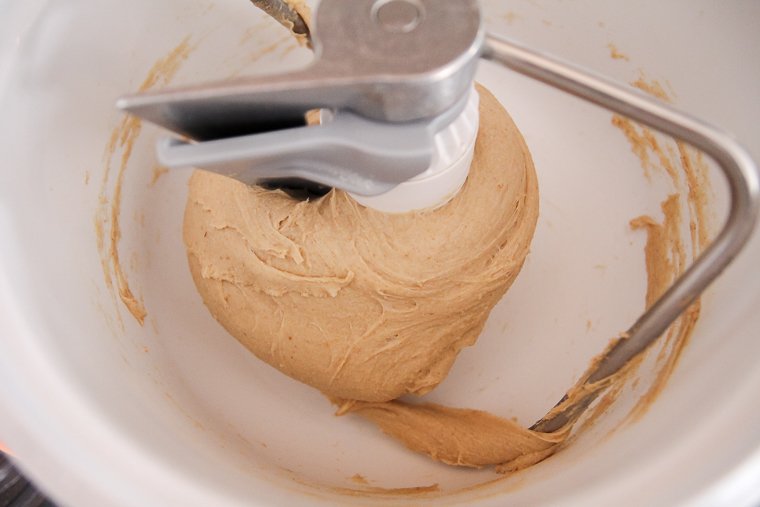
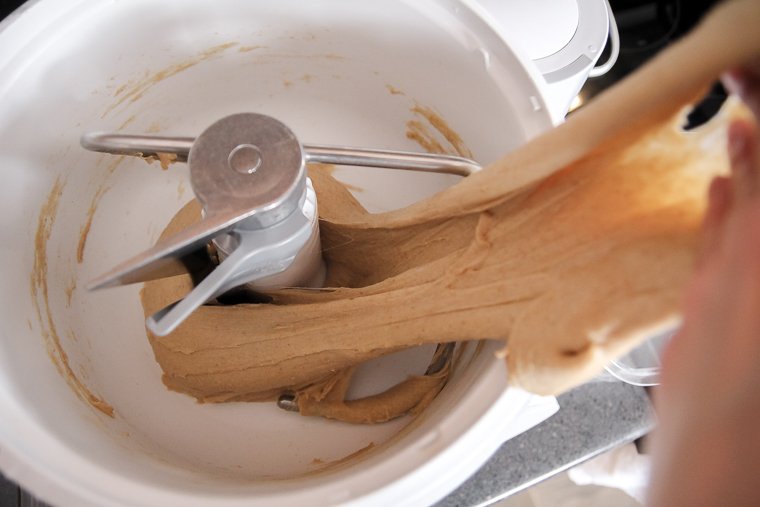
Step 3 – Bulk Ferment
I turn out my dough onto a clean countertop to form it into a tidy ball. Then I place it in a Cambro container so I can mark the starting line with a dry-erase marker.
Cover the dough and allow it to sit in a warm place until it has doubled in volume.
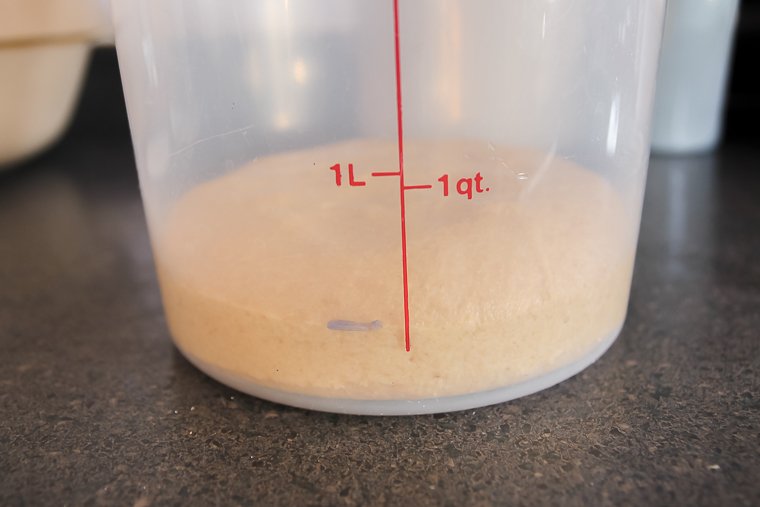
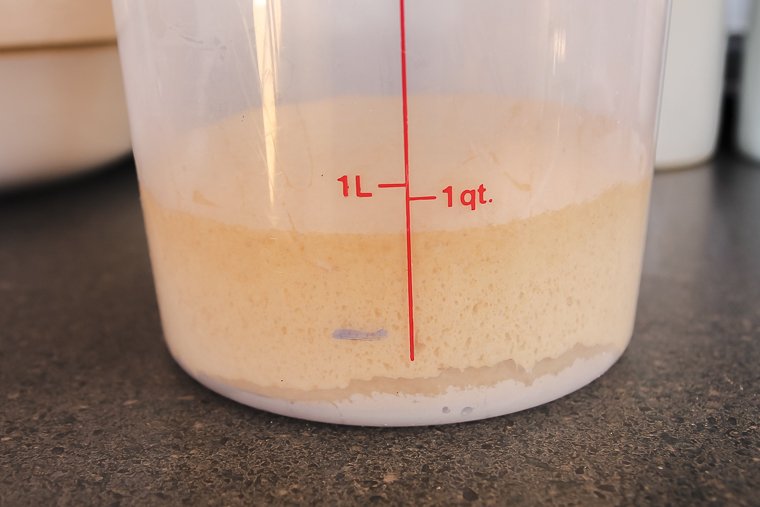
Step 4 – Divide and Shape
When it’s time to shape the dough, turn it out onto a clean surface and divide it into ten 75g pieces.
Notice how my whole wheat dough looks when I slice through it. You can see how it holds its shape because the gluten is well-developed.
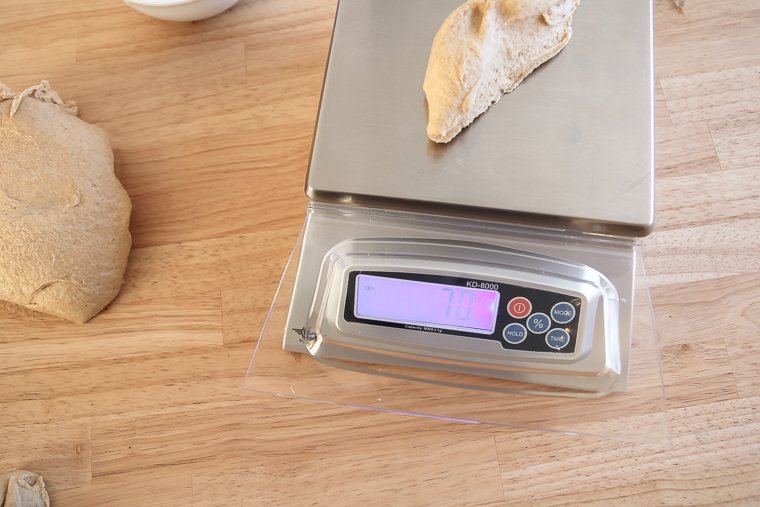
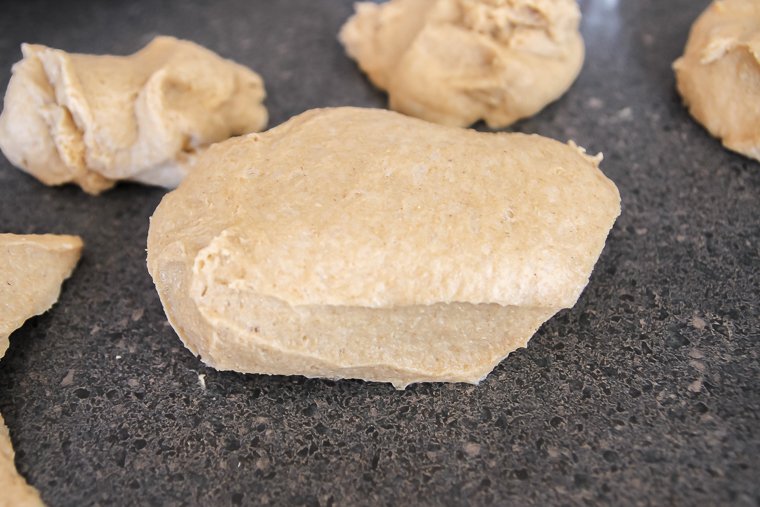
Degass the first piece of dough with your palm to remove any air bubbles.
Form the dough into a ball and then scoot the ball in a circular motion against the counter with your hand cupped around the dough to make a tight, round ball.
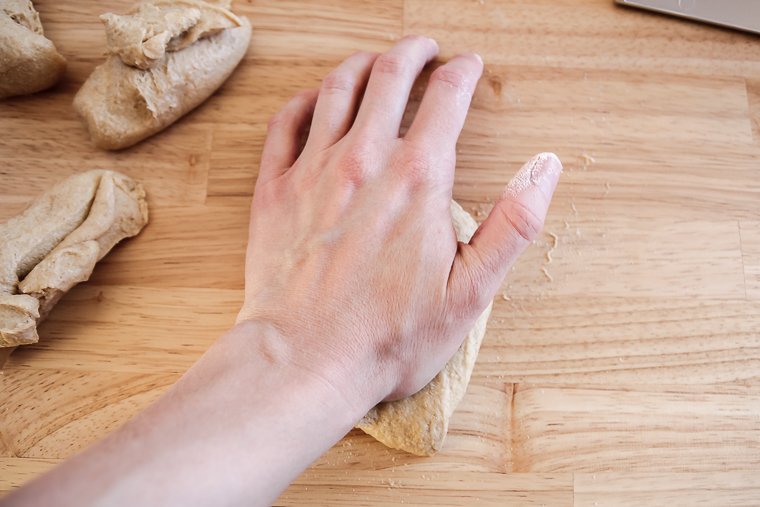
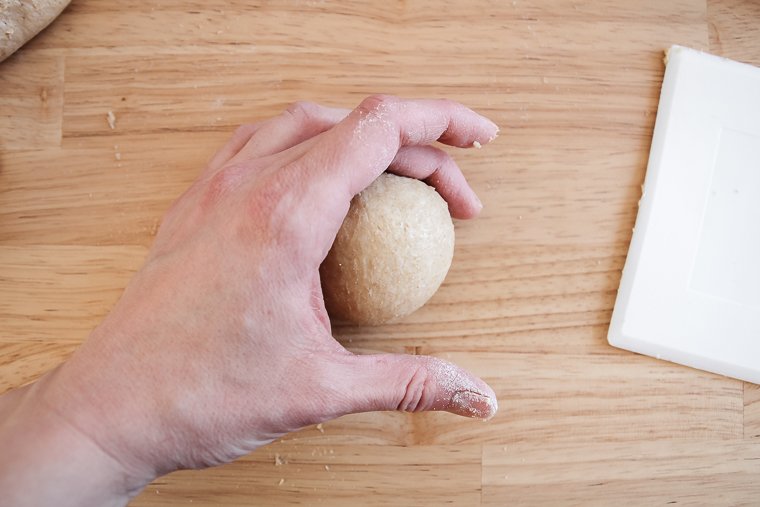
Repeat to shape the remaining buns.
Step 5 – Final Proof
Arrange the whole wheat sourdough hamburger buns on two half-sheet pans lined with parchment paper. Cover with plastic wrap and set them in a warm place to proof.
When done, they should be more-than-double in size, be very puffy and soft to the touch, and slightly wobble when the pan is bumped.
Don’t proof so long that the buns start to deflate, however.
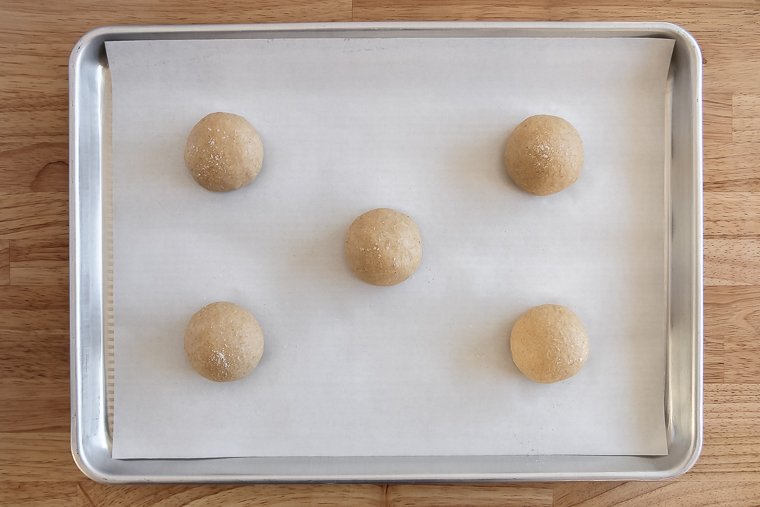
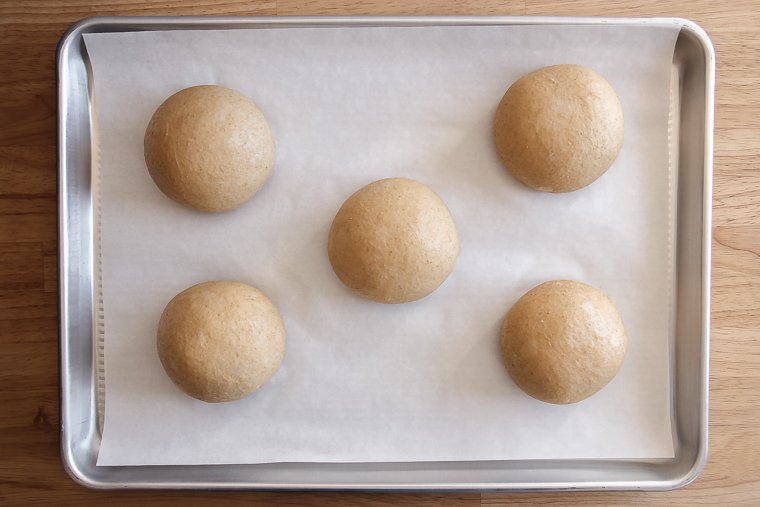
Meanwhile, preheat your oven to 425°F with two racks set in the center.
Step 6 – Egg Wash, Toppings, and Bake
When the buns are fully proofed, whisk together the egg and milk to make the egg wash.
Gently brush this over the entire surface of each bun, but be careful that you don’t press down and deflate the delicate buns.
Sprinkle on sesame seeds, if you desire.

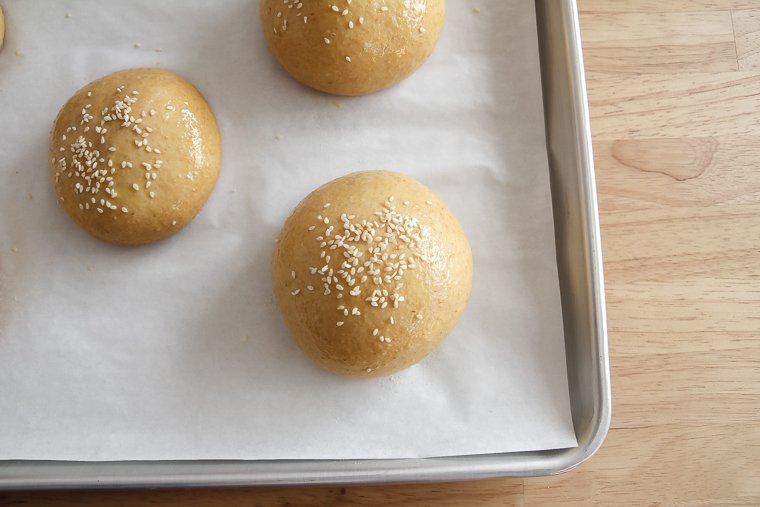
Stagger the pans on the two racks and bake for 10 minutes. Then rotate the pans and bake for an additional 6-8 minutes or until the buns are golden-brown in color.
Transfer the buns to a cooling rack and allow them to cool completely before slicing or storing.
To toast them, I lay the sliced buns face up on a sheet pan, butter or oil them, and broil them in the oven for 2-3 minutes.
How to Store Whole Wheat Sourdough Hamburger Buns
The hamburger buns store well in an airtight container at room temperature for 3-4 days.
For longer storage, freeze in a freezer storage bag in a single layer for up to three months. Leave at room temperate to thaw before warming/toasting and serving.
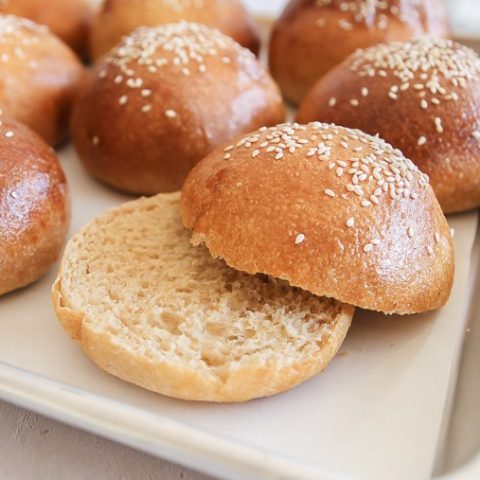
100% Whole Wheat Sourdough Hamburger Buns
The best 100% whole wheat sourdough hamburger buns that are actually light and fluffy! This is a great recipe for freshly milled hard white or hard red wheat berries (or whole wheat flour that you purchase).
Ingredients
Prepared Starter (Night Before)
- 51g ripe sourdough starter (can be white or whole wheat at 100% hydration)
- 58g water
- 24g granulated sugar
- 58g whole wheat flour (see notes)
Yundane (Night Before)
- 67g whole wheat flour
- 67g boiling water
Final Dough (Next Morning)
- All of prepared starter (from above)
- All of yundane (from above)
- 222g whole wheat flour (plus extra for dusting)
- 56g egg (about 1 large egg)
- 28g granulated sugar
- 125g whole milk, warmed slightly
- 7g kosher salt
- 30g salted butter, cold, cut into small cubes
Egg Wash
- 1 egg
- 1 tablespoon milk
- Sesame seeds for topping (optional)
Instructions
- Prepare starter and yundane (night before): Mix the starter ingredients in a bowl or jar, cover, and let sit at room temperature for about 12 hours (overnight) until it has increased in size, has many bubbles on the top surface, and has a pleasant "yeasty" smell. To prepare the yundane, stir together the flour and boiling water until it forms a paste and all the dry flour is absorbed. Cover and refrigerate until the next morning.
- Mix and rest (next morning): Into a stand mixer fitted with a dough hook, add prepared starter, yundane, whole wheat flour, egg, sugar, and milk. Mix on low speed for a couple of minutes until combined. Cover the dough, and allow it to rest for 30 minutes.
- Add salt and butter and knead: After 30 minutes, add the salt and cold butter cubes and knead until the butter is thoroughly incorporated. Continue to knead on low speed for 12-15 more minutes until the dough becomes shiny, has a "taught" feeling, cleans itself off the bowl of the mixer, and forms a very thin windowpane when stretched with damp fingers. (You can knead dough by hand using slap-and-folds if you don't have a mixer.)
- Bulk ferment: Form the dough into a ball, place in a bowl or straight-sided container and cover with a lid or plastic wrap. Leave at room temperature until doubled in volume. (The bulk rise took me 2 hours with a dough temp of 73°F and ambient temp of 75°F, for your reference.)
- Divide and shape: Line two half sheet pans with parchment paper. Remove dough to a clean countertop and divide into 10 pieces (75g each). Degas the first piece by pressing it flat with your palm to remove any air bubbles. Shape into a ball, then tighten the ball by scooting the dough against the surface of the counter in a circular motion with your hand cupped over the dough. Lightly flour your hands as needed to prevent sticking. Repeat to shape remaining buns.
- Proof: Arrange buns on the prepared pans, 5 to each pan. Cover loosely with plastic wrap to prevent the buns from drying out. Leave to proof until the buns have more-than doubled in size, relax outward, are soft to the touch, and slightly wobble when the pan is bumped (proofing took me 3 hours, 50 minutes at 75°F). Meanwhile, preheat oven to 425°F with two racks arranged in the center.
- Egg wash, top, and bake: Whisk together egg wash ingredients. Gently brush egg wash over the surface of each bun, being careful not to deflate the buns. Sprinkle with sesame seeds, if desired. Bake both pans together for 10 minutes, then rotate pans and bake for an additional 6-8 minutes or until buns are golden brown. Transfer buns to a cooling rack. Allow to cool completely before slicing or storing. Buns are delicious toasted, and are even better on day 2. They freeze well for up to 3 months.
Notes
- Whole wheat flour notes: I like white whole wheat flour for this recipe (I finely mill my own hard white wheat berries in my Mockmill). White wheat is still a wholegrain flour, it's simply a different variety of wheat with a lighter color and more mild flavor than traditional red wheat. You can use regular whole wheat flour (or mill a hard red wheat). Do not use soft white wheat or pastry flour. You'll need to mill 360g flour total to have enough for the prepared starter, yundane, final dough, and additional flour for dusting.
- The yundane needs to sit overnight for the starch in the flour to gelatinize. It will not function the same way if made the same morning the dough is mixed.
- The keys to the soft, light texture of these buns is kneading for the proper length of time and proofing sufficiently. Use the dough as your guide. Note that the dough should be quite sticky before kneading.
- This recipe makes 10 standard-size burger buns that work well for hamburgers made with 1/4lb ground beef. If you want even larger sourdough buns, make only 8 buns (93g each) out of the recipe. You can also make small whole wheat slider buns by forming 20 buns (37g each) with the same amount of dough. You can fit up to 12 buns on one half sheet pan if you want to double the batch and don't have extra oven space. They will touch slightly when baking.
Recommended Products
As an Amazon Associate and member of other affiliate programs, I earn from qualifying purchases.
-
 USA Pan Bakeware Half Sheet Pan
USA Pan Bakeware Half Sheet Pan -
 King Arthur, 100% Organic White Whole Wheat Flour
King Arthur, 100% Organic White Whole Wheat Flour -
 Hard White Wheat Berries
Hard White Wheat Berries -
 White Universal Plus Mixer (Use code ABERLEHOME for $20 off)
White Universal Plus Mixer (Use code ABERLEHOME for $20 off) -
 OXO Good Grips Stainless Steel Scraper
OXO Good Grips Stainless Steel Scraper -
 Flexible Dough Scrapers
Flexible Dough Scrapers -
 Thermoworks SPOT Ambient Thermometer
Thermoworks SPOT Ambient Thermometer -
 Cooling Racks
Cooling Racks -
 Pastry Brushes
Pastry Brushes -
 Cambro 4 qt Lid
Cambro 4 qt Lid -
 Cambro 4 qt Container
Cambro 4 qt Container -
 Bakers Math Kitchen Scale - KD8000
Bakers Math Kitchen Scale - KD8000 -
 Thermapen ONE Instant Read Thermometer
Thermapen ONE Instant Read Thermometer -
 If You Care Parchment Paper
If You Care Parchment Paper
Nutrition Information:
Yield: 10 Serving Size: 1Amount Per Serving: Calories: 214Total Fat: 6gSaturated Fat: 3gTrans Fat: 0gUnsaturated Fat: 3gCholesterol: 49mgSodium: 349mgCarbohydrates: 34gFiber: 4gSugar: 6gProtein: 8g
*Nutrition information is not always accurate.
I’m so grateful for your comments, reviews, and questions! Your star ratings help others discover my recipes, and your feedback helps me make improvements. Thank you for your support!







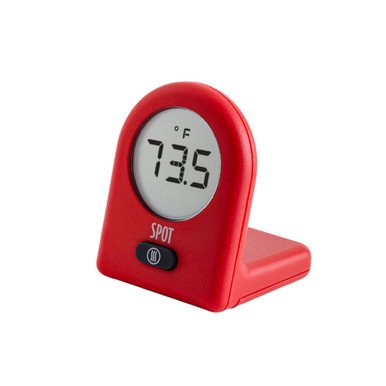





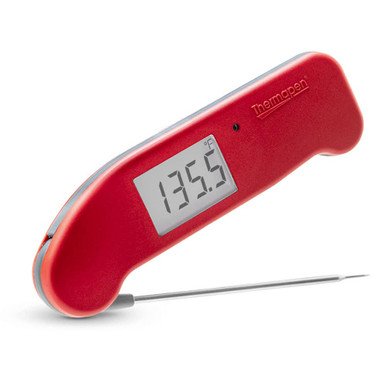

I’m SO impressed with these buns! They really were light, fluffy, moist, chewy, had just enough structure for eating a big burger without being hard or dry at all! My kids are used to store bought brioche buns and they gobbled them up! Definitely a keeper… now I’ve gotta go make every other whole wheat recipe on your site. Thank you!!!
PS—I’m with the other commenters, I ground my wheat on the finest setting on my NutriMill Harvest and after 15+ min kneading in the Kitchen Aid I still had to add a wee bit of flour to get it pulling away from the sides. But that’s not a big deal—you kinda expect to have to feel out the flour amount. Maybe you could put a range in the recipe to give people a heads up?
In any case this is going to be a staple over here. Still having a hard time believing that was 100% whole wheat!
PS What do you think about subbing honey for the sugar? How would that change it?
I attempted this recipe and it was waaaaaaaaay to wet. I added about 50 more grams of flour and it’s still too wet. I then read your bio and see you are in the mountains of CO. Much different ratios are required for those of us at lower altitudes. It would be great to add to your notes that you are at high altitude and adjustments need to be made for many of us. Based on king arthur’s chart, I would need 75 grams less liquid than your recipe assuming you are around 10,000ft. This looks like a great base for a recipe so I’ll probably experiment a few more times with different ratios.
Thanks for your feedback, Bethany! I hope the recipe works out for you with some adjustments. I’m close to 9,000ft, if that helps. I’m sure the dry air up here is a factor. Another difference with the hydration can come from store-bought whole wheat flour vs. home ground flour and how fine the grind is. This dough is also quite sticky before the gluten is developed. Let me know how it goes if you try it again.
I used Egg Replace Ener-G as directed on the package and it worked well. (Always does!) I even diluted it for the egg-wash.
Thanks for sharing your substitutions, Ann!
Hi, what can I use as a sub for the milk and butter as we’re dairy free.
Would almond milk and cold coconut oil work?
Hi Leah! Yes, I think those should work just fine!
I used almond milk (from Costco) and it worked fine.
I tried this recipe, measuring everything to the gram, and my dough was like glue that would never come together properly. I tried kneading in the mixer and on the slap and fold, but it was so sticky and unworkable that it just stuck to everything! I added more flour to see if that would work and it changed nothing. This is my first unsuccessful sourdough recipe, and I’m so sad because they look so delicious!!
Oh no, I’m sorry to hear that! Were you using freshly milled flour or store-bought?
I’ve made a lot of sourdough from freshly milled flour and I’ve never had one turn out like this! They were light, soft, almost brioche-like buns. If I hadn’t made them myself, I would’ve been sure they were made from white flour. Thank you for this recipe! * All that being said, I did have an issue where my dough was far too wet, and I had to add more flour to it in the mixing bowl… quite a bit more flour. This is a very common experience for me, I’ve never once had a freshly milled flour dough pass the window pane test, they always need more flour and still won’t stretch without breaking. I always assumed it was because I was using freshly milled flour and the recipes I’m usually following are using white flour, but in this case I thought it would work since the recipe called for freshly milled flour. Either way, it turned out amazing, and I’ve learned not to worry about the state of the dough in the mixing bowl. Just curious as to why only I seem to have this issue. Thank you again!
Hi Angelina, I’m so glad you enjoyed the whole wheat buns! As far as your freshly milled flour dough being too sticky… if your flour is not milled to the same fineness as mine it won’t be able to absorb as much water. Or if you’re in a humid environment, the hydration of your dough could be affected. Just a couple of thoughts. 🙂 Sounds like you’ve figured out how to make the right adjustments.
Is there anything that would work as an egg substitute? Thanks 🙂
Ditto! Thanks 🙂
My husband is diabetic and we are trying to cut our refined sugars. Could honey or maple syrup be substituted in this reciped?
Hi Danyalle! Yes, I think either would work. Just cut back on the milk a little.